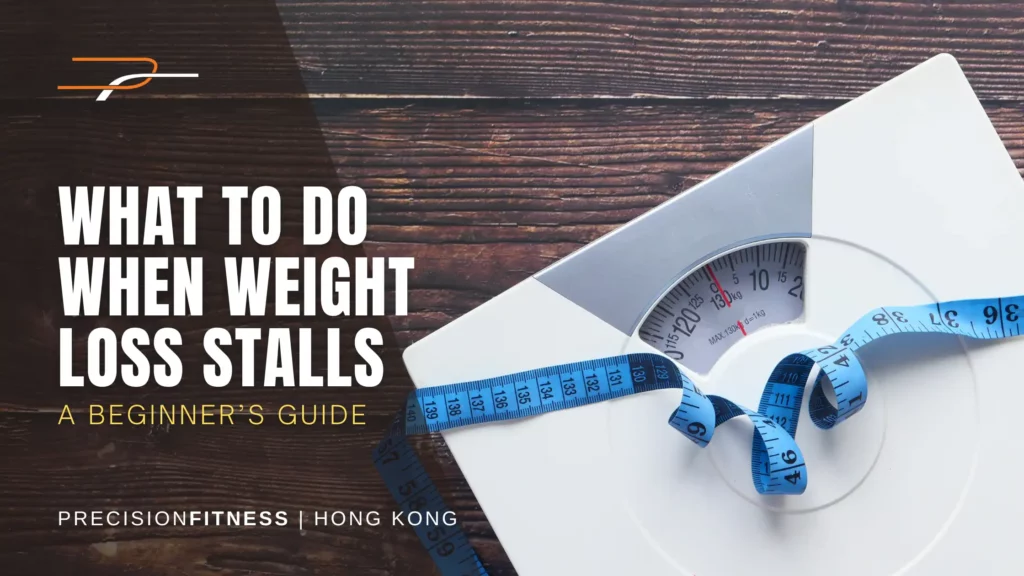Has this ever happened to you? You start off motivated, stick to your diet plan, and put in the effort at the gym, but then something unexpected happens – the scale stops moving.
If you’re feeling stuck and wondering what to do when your weight loss stalls, you’re not alone. In this guide, we’ll explore the reasons behind weight loss plateaus and provide practical steps to help you break through them.
Understanding the Weight Loss Plateau.
Before we dive into solutions, it’s essential to comprehend why your weight loss might have stalled. A common misconception is that you must slash your calories drastically to continue losing weight. In reality, most individuals can achieve weight loss at a daily caloric intake of around 1500 calories for women and 1800 calories for men. Even factors like advanced age (over 65) and thyroid issues, which can slow down metabolism, are rarely the primary culprits for a weight loss plateau.
Are You Really Eating What You Think?
One of the most common reasons for stalled weight loss is underestimating calorie intake. It’s challenging to count calories with absolute precision, especially when following low-calorie diets.
You might be diligently adhering to your calorie limit during weekdays but unknowingly consuming more on weekends or indulgent days. Most people who face weight loss plateaus are not intentionally misrepresenting their dietary habits.
Action Tip #1: Look for clues by tracking more diligently and working with a coach to interpret the data.
Tracking Your Food: Uncover the Truth
Tracking everything you eat for two weeks is an essential step to identifying the real cause of your weight loss plateau. However, it’s essential to emphasize that this is about collecting data, not a judgment of your worth as a person.
Here’s something worth considering: Most people want to impress their trainers and may avoid recording moments of indulgence. Is that you?
Action Tip #2: Gather data about your eating by maintaining a detailed food diary for two weeks. Avoid judging your choices and try to remind yourself that all the information is valuable. It’s crucial to record this for an accurate assessment of your habits because what gets tracked gets managed.
Analyzing the Data: Is the Scale Moving?
After two weeks of tracking, you may notice one of two trends.
Outcome A: The Scale is Moving because you’re staying around your calorie limit and lost weight during this period. This suggests that your initial calorie goal was working. However, unbearable hunger and cravings indicate that it might not be a sustainable strategy.
Action Tip #3: Try an Experiment. As an “experiment,” increase calorie intake slightly to make it more manageable while still maintaining a calorie deficit for two weeks. If it doesn’t work, you can always return to your previous plan, but it should be more tolerable.”
Outcome B: Gaps in Your Food Log. If there are gaps in your food log, get curious about those days. Don’t jump to conclusions, but try to see what was happening to paint a better picture of the full story.
Action Tip #4: Track Calories on Weekends without a Target. Build the skill of accurate tracking without altering the diet itself, helping to understand your eating habits better.
Here are a couple more experiments worth playing with:
Experiment #1: Give yourself more calorie headroom. If you recall consuming extra calories on those days, consider adjusting the calorie target. Collaborate with your coach to determine how to interpret the data and adjust the strategy.
Experiment #2: Try a Different Approach. If calorie tracking isn’t effective, encourage a different approach like tracking protein, vegetable servings, or hunger/fullness metrics.
Remember: It’s normal if you find yourself hesitating to try these steps due to feelings of guilt or shame. It’s essential for your success to create trust and a positive relationship with food without judgment. So start slow and keep track of what you track.
The Power of Trust and Support by Hiring a Coach.
In your journey towards breaking the weight loss plateau, you must have a strong support system of people who understand and support you.
You need to feel comfortable sharing everything without fear of judgment. By working together with a qualified nutrition coach and experimenting with various approaches, you can regain control of your weight loss journey.
If you ever feel that you’re not making the progress you desire, remember that it’s not about willpower or character. It’s about finding the right approach that works for you.
Ultimately, the key to overcoming a weight loss plateau lies in building a strong partnership with yourself and your social circles, adapting your strategy, and staying focused on your long-term health and wellness goals.








